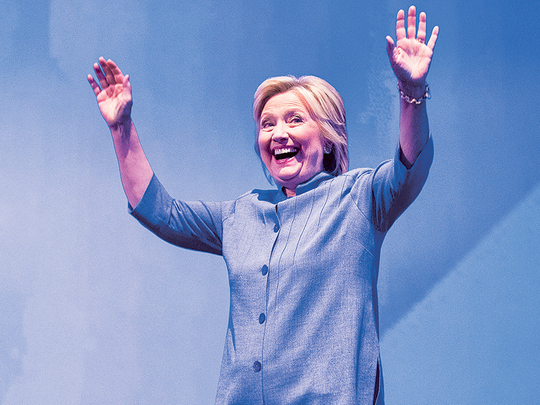
Washington: This week, the Democratic Party will nominate Hillary Clinton as its official nominee for the presidency, marking a new high in Clinton’s long political career.
Clinton has been in the national political limelight for at least 25 years. After graduating from Yale Law School in 1973, she worked for the Children’s Defense Fund and the congressional committee investigating President Richard Nixon. After marrying Bill Clinton in 1975, she worked as a lawyer and was involved in advocating for children’s rights.
She became First Lady of Arkansas after Bill Clinton was elected governor in 1978 and became First Lady of the United States after he was elected president in 1992. She was much more engaged in policy than most first ladies, earning both admiration and scorn. In 2000, she became the first woman to represent New York as a US Senator and was re-elected in 2006.
In 2008, she ran for president, but lost the Democratic nomination to Barack Obama. She then supported Obama and campaigned for him in the general election. She served as Secretary of State from 2009 to 2013, visiting 112 countries — more than any other secretary of state. In this role, despite ongoing opposition from Republican politicians, she was popular with the US public, with high approval ratings through most of her tenure.
Clinton launched her campaign for the presidency in September 2015. Clinton biographer Carl Bernstein has described her as “a mind conservative and a heart liberal”. In the Democratic primaries, she faced strong opposition from Bernie Sanders, who rallied the far left wing of the party, which has pulled Clinton’s positions somewhat more to the political left. Still, Clinton won more votes, and Sanders recently endorsed her.
Her extensive political career provides Clinton with important advantages. Many voters prefer a presidential candidate with relevant experience, and Clinton is one of the most experienced candidates in recent history. She has a high level of name recognition, a strong base in the Democratic party and significant campaign experience. She has had many years to learn how to cope with personal insults from political opponents — a useful skill as she battles Trump.
On the other hand, her years in the national spotlight create risks. “She’s a highly partisan figure; she has been campaigning for Democrats on a national level since 1991,” said Chris Oates, Associate with Oxford Analytica. Clinton’s reputation also is weighted down by controversies over the years including several during her husband’s presidency and others from her time as secretary of state. While these scandals did not lead to legal indictments of Clinton, and her supporters say political rivals used flimsy evidence to defame her, the controversies have left many Americans with a sense that she is, at a minimum, untrustworthy — two recent polls found that 65-67 peer cent of respondents did not think of her as honest. She now has high unfavourability ratings, currently around 55 per cent, making her one of the most unpopular major-party candidates for president in recent decades, exceeded only by Trump.
As a campaigner, many observers say Clinton is excellent at communicating with individuals and small groups but struggles at rallies and on TV. “Those who know her say she’s a great listener and really cares about the nitty gritty of governance. That doesn’t translate well onto the big campaign stage,” said Oates. “I think she does very well in large crowd settings in big auditoriums in South Korea or Pakistan, but there’s something about the glare of [US] national media that makes her much more guarded,” said Kim Ghattas, a BBC correspondent and author of The Secretary: A Journey with Hillary Clinton from Beirut to the Heart of American Power. Now she will compete with Trump, who has little knowledge of policy, but is great with sound bites and crowds.
Going forward, Clinton will emphasise her embrace of diversity with slogans such as “the American dream is big enough for everyone.” Her campaign will try to unite the Democratic party and ensure turnout among key voter groups. She will highlight her positions on jobs, inequality, paying for college and fighting terrorism, while attacking Trump as “temperamentally unfit” to be president.
— Kerry Boyd Anderson is a writer and political risk consultant












